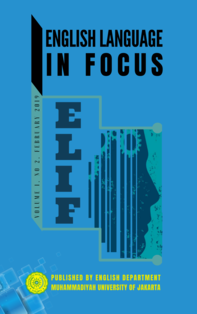The Effectiveness of Task Based Language Teaching (TBLT) Toward ESP Students’ Writing Achievement
DOI:
https://doi.org/10.24853/elif.1.2.121-126Keywords:
ESP students, TBLT (Task Based Language Teaching), Writing achievement.Abstract
TBLT (Task Based Language Teaching) is an approach to language teaching that provides opportunities for students to engage in the authentic use of the target language through tasks. Writing is a process of formulating and organizing ideas in right words, delivering the writer’s purpose, and presenting them on a piece of paper. The objective of this research is to know the effectiveness of TBLT (Task Based Language Teaching) toward ESP students’ writing achievement at STIE Muhammadiyah Tanjung Redeb. Based on the research result on SPSS 24 calculation, it showed that t-value was 16,678, while t-table was 2,045 in the 5% of alpha significance level and 32 degrees of freedom (df). Thus, it indicates that the t-value is higher than t-table (16,678>1.693 and can be concluded that there was a significant difference between the two means. In addition, the alternative hypothesis (Ha) of the study was accepted and TBLT (Task Based Language Teaching) was an effective method in teaching writing.References
Arikunto, S. (2010). Prosedur Penelitian Suatu Pendekatan Praktik. Jakarta: Rineka Cipta.
Ellis, R. (2009). Task-Based Language Teaching: Sorting Out the Misunderstandings. International Journal of Applied Linguistics, 19(3), 221–246. https://doi.org/10.1111/j.1473-4192.2009.00231.x
Sugiyono. (2013). Metode Penelitian Kuantitatif, Kualitatif, dan R&D. Bandung: Alfabeta.
Syafini, & Rizan, T. N. (2010). The Effects of Cooperative Learning in Enhancing Writing Performance. Retrieved from http://www.ukm.my/solls09/Proceeding/PD%0AF/ Shafini.pdf
Downloads
Published
2019-02-27
Issue
Section
Articles
License
Authors who publish with this journal agree to the following terms:
- Authors retain copyright and grant the journal right of first publication with the work simultaneously licensed under a Creative Commons Attribution License that allows others to share the work with an acknowledgment of the work's authorship and initial publication in this journal.
- Authors can enter into separate, additional contractual arrangements for the non-exclusive distribution of the journal's published version of the work (e.g., post it to an institutional repository or publish it in a book), with an acknowledgment of its initial publication in this journal.
- Authors are permitted and encouraged to post their work online (e.g., in institutional repositories or on their website) before and during the submission process, as it can lead to productive exchanges, as well as earlier and greater citation of published work (See The Effect of Open Access).


